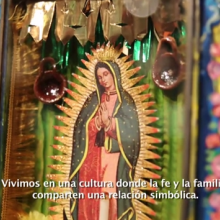latino culture
Rev. Sam Dessórdi Peres Leite is rector of St. James the Apostle Episcopal Church in Tempe, Ariz. He spoke to Sojourners associate news editor Mitchell Atencio.
IN MY CHILDHOOD we would go to the cemetery early in the morning on the Day of the Dead [Nov. 2]. We would clean the graves and paint them. We would eat by the graves and tell stories of the person buried there and laugh. It was a light experience and joyful in the sense of becoming one family again, so the deceased and living were together for at least one day.
When I was in Washington, D.C., I noticed the Days of the Dead becoming more popular for people who are not of Mexican, Central American, or Latin American descent. Churches started bringing in the elements [of the celebration], not knowing how to properly use them. So I offered workshops to help church leaders understand where the tradition came from. It’s important for people to learn the historical meaning, how Latinos identify with the festival, and ask, “How can we honor that tradition?”
As a boy growing up, Joanna Maria Cifredo wasn’t like her brothers.
“My brothers looked at females because they wanted to be with a female,” Cifrado says, in new video resource by the Human Rights Campaign that premiered Oct. 1. “I looked at females more like, ‘Oh, I wish I was her.’ ”
Now, Joanna has decided to physically identify as a woman full time.
Her voice joined many others in Before God: We are All Family, a new film focused on the experiences of Latina LGBT people. She also participated, along with her mother Maria Vega-Cifredo, in a discussion panel that included the filmmaker at the first public viewing of the resource at the GALA Hispanic Theater in Washington, D.C.
Focusing on the important role family and faith play in Latino communities, the video resource is the newest component to a bilingual discussion guide produced by the HRC and the National Latina/o LGBT Human Rights Organization, among others. The organizations developed the guide with the aim of helping Latinos have a conversation about faith and LGBT inclusion.
The guide, written by Rev. Dr. Miguel A. de la Torre, with help from Rev. Dr. Ignacio Castuera and Lisbeth Melendéz Rivera, gathers 14 testimonies into six chapters, each with stories, questions, and exercises focused on what it means to be LGBT and Latina. Inside the guide, created in 2011, are sections on family, the gift of our bodies, the Bible, and solidarity.

